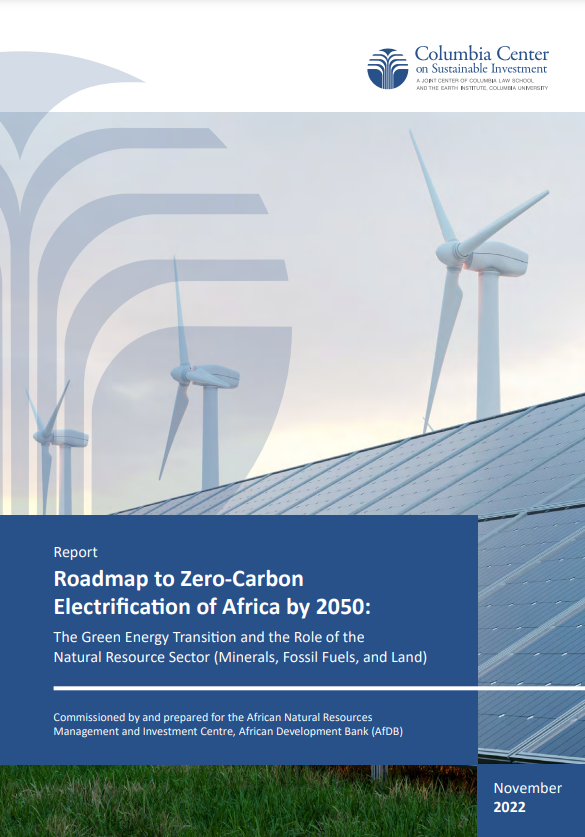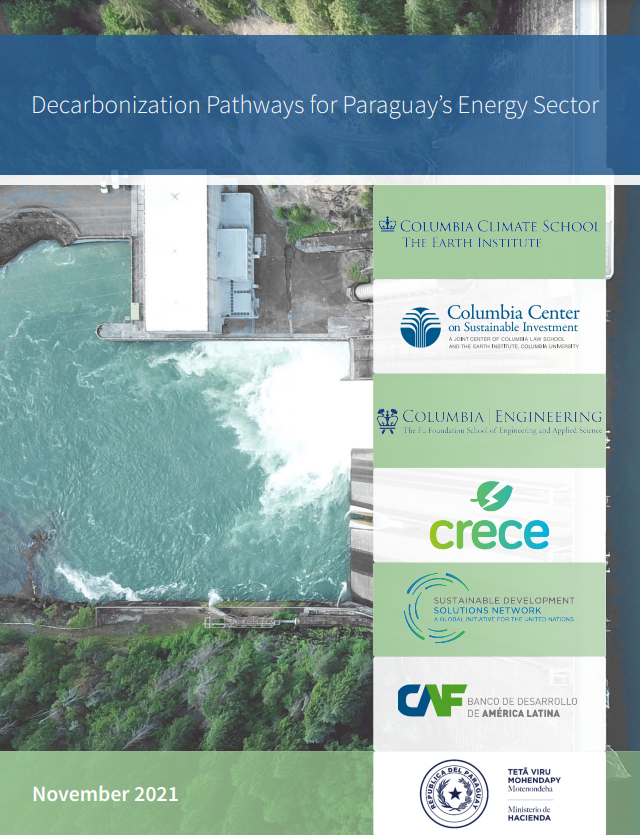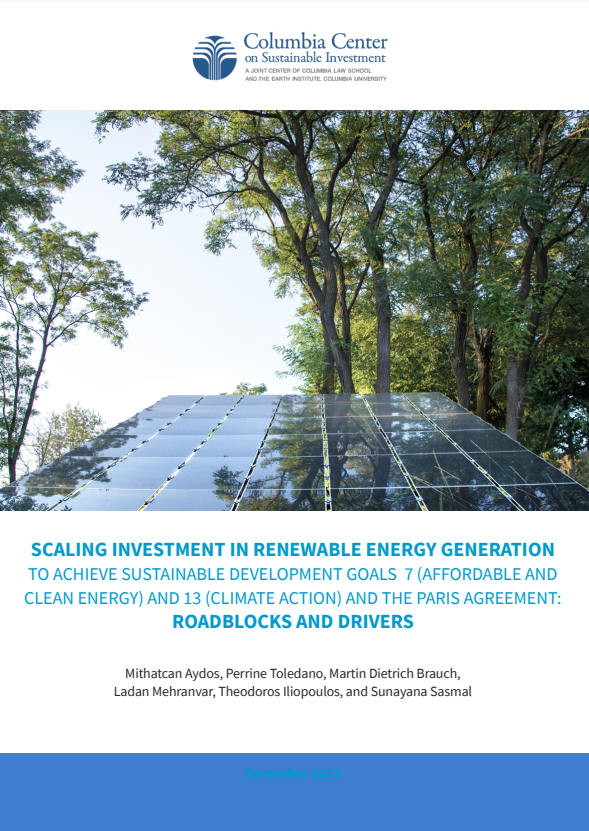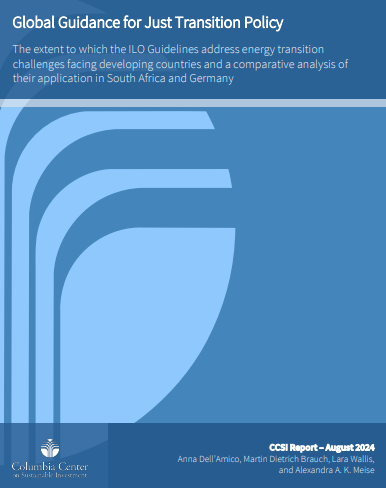We develop legal, policy, and financial frameworks, roadmaps, and tools to shape and regulate climate-aligned investment in renewable energy systems and to phase out and transition away from fossil fuels in energy systems in a just, orderly, and equitable manner.
Transition Planning for Policymakers and Companies
CCSI has been advising the Government of Paraguay since 2012, in partnership with the Sustainable Development Solutions Network (SDSN). In 2013, CCSI developed a high-level strategic plan around using Paraguay's vast hydropower resources for sustainable economic development and the diversification of its economy. In 2021, CCSI, the Quadracci Sustainable Engineering Lab at Columbia University, and the Natural Resources and Energy Research Center (CRECE) co-authored a report, Decarbonization Pathways for Paraguay’s Energy Sector, with policy guidance for zero-carbon development of four energy-use sectors: electricity, buildings, biomass, and transport.
The African Union and the African Development Bank (AfDB) are engaged in high-level efforts to design and implement comprehensive strategies for Africa’s energy development in order to achieve 100% access to modern energy services based mainly on zero-carbon energy sources, while developing and utilizing Africa’s hydrocarbon resources in a manner supportive of Africa’s long-term sustainable development. Against this backdrop, Prof. Jeffrey Sachs, University Professor at Columbia University and President of the UN Sustainable Development Solutions Network (SDSN), is supporting the AfDB in analyzing alternative energy roadmaps to 2050. In 2022, CCSI published its Roadmap to Zero-Carbon Electrification of Africa by 2050.
CCSI is collaborating with experts at CETEx, King’s College, the World Bank and Aviva Investors to develop the policy case for government-led transition planning as well as a handbook leveraging the framework of the UK’s Transition Planning Taskforce (TPT) to facilitate the integration of transition planning efforts between governments and the real economy. The T20, the “idea bank” of the G20 published the first result of this collaboration. The latest report develops a set of principles-based recommendations for national transition planning, and is accompanied by a handbook of detailed guidance, examples, case studies, and resources. Read more.
Assessing the credibility and robustness of companies’ transition plans remains a significant challenge for the energy transition. To address this challenge, CCSI supported the World Benchmarking Alliance in its creation of the Assessing Transition Plans Collective (ATP-Col). After working with 90 experts from 40 organizations, ATP-Col released a keystone document which aims to harmonize company transition plan assessment practices. The document seeks to pave the way for ambitious future standards, practices, and regulations that assess the robustness of companies' transition plans. Read More.
Fossil Fuel Phaseout
The energy transition will require the closure and decommissioning of offshore oil and gas facilities and infrastructure, as the energy system moves away from fossil fuels. CCSI and the Sabin Center for Climate Change Law at Columbia University conducted a survey of laws, regulations, leases, and contracts governing the allocation of liability involved in decommissioning offshore oil and gas infrastructure. The legal research work supports analysis of the economics and policy of offshore decommissioning by the Institute for Energy Economics and Financial Analysis (IEEFA). The work also includes a survey of best practices identified in the relevant scholarly and practitioner literature, and recommendations on improvements to existing regimes or practices.
The Nigerian National Petroleum Corporation’s (NNPC) persistent governance challenges have both hampered Nigeria’s oil sector development and deprived the country of public resources. The oil, climate, and COVID-19 crises and the ramp-up of the low-carbon transition exacerbate this reality. CCSI’s report, Equipping the Nigerian National Petroleum Corporation for the Low-Carbon Transition: How Are Other National Oil Companies Adapting?, discusses how these crises provide a unique opportunity and political momentum for the Nigerian government and legislature to reconsider NNPC’s role in the energy transition and implement profound reform of the company. While it is an incredible policy and political challenge, other NOCs are showing the way, and policy guidance is already out there to guide countries and companies.
In order to stay below the 2-degree Celsius temperature increase target agreed upon in Paris, approximately two thirds of fossil fuels reserves will need to be left underground or be stranded. This raises the critical global challenge of how such stranding could be managed. While McGlade and Ekins (2015) have assessed this question by stranding more costly assets, the equity dimension has not been taken into account. Given the resource dependence both for revenues and expanding electrification, the equity dimension is particularly important for developing countries. These issues were explored in the following blogs, and we continue to explore the topic with Prof. Jeffrey Sachs, Director of the Earth Institute’s Center for Sustainable Development, in order to propose stranding scenarios that comply with the Paris Agreement and are equitable at the same time.
CCSI has been researching how institutional investors can effectively engage fossil fuel companies in order to move toward a decarbonized economy more quickly. CCSI mapped out the key shareholders’ resolutions on an interactive timeline. Users can also find a non-exhaustive list of articles and news reports capturing activities that the largest non-state oil and gas companies (ExxonMobil, British Petroleum, Royal Dutch Shell and Total) have undertaken with respect to climate change and renewable energy investments since the 1970s. Apart from allowing users to compare actions among the selected oil & gas majors, it also provides an overview of how these activities fit within the public debate around climate change.
More than one third of the energy demand growth is projected to come from power generation, particularly from countries with high population growth rates and lack of adequate electricity access. Some projections forecast that fossil fuels will remain the dominant energy form, but these projections are inconsistent with the IPCC’s recommendations. Against this backdrop, CCSI and the Sustainable Development Solutions Network (SDSN) have published a briefing note summarizing the ways in which international oil and gas companies can help expand access to affordable and clean energy and take urgent action to combat climate change and its impacts. The briefing note outlines steps the oil and gas industry can take to prepare their businesses for the future, to strengthen efficiency and impact of current operations, and to leverage resources for broader partnerships and collaboration.
The 2015 ILO Just Transition Guidelines provide authoritative and valuable international guidance for just transitions. CCSI’s Global Guidance for Just Transition Policy compares and contrasts how developing and developed countries have approached just transition policymaking in the energy sector by examining legal and policy instruments adopted in South Africa and Germany and their application of the ILO Guidelines. It also investigates the extent to which the ILO Guidelines address developing countries’ unique challenges and provides recommendations to shape further guidance on just energy transition policymaking from international institutions to support developing countries.
The petroleum industry is volatile, and governments in “new producer” countries have operated at a significant information disadvantage when negotiating with international oil companies. This challenge is growing today; new producer countries face intensifying questions around whether to offer fiscal incentives to maintain investment in the face of 1) the pandemic-induced volatility in oil prices and 2) long-term questions about the future of the industry in the face of the climate crisis and the global energy transition.
This confluence of short-term and long-term uncertainty is prompting a reexamination of the narrative that once took hold in many new producer countries. The traditional story was one of linear progression from being non-producers to small levels of production to ultimately having oil and gas become a major economic contributor over the long term.
This notion of progression was associated with a commonly held theory: After a country’s first major discovery, the geological risk that wells will be dry was expected to decrease. Countries could therefore shift from a position of having to grant tax breaks (and other concessions) to international investors, to taking a tougher stance in laws and negotiations for new projects going forward.
In this paper (executive summary here), co-authored with NRGI we examine whether this theory has been borne out in practice and make recommendations to support new producers in their navigation of the uncertainty associated with the energy transition.
Renewable Energy & Sustainability
In December 2022, CCSI published two reports on the roadblocks and drivers of renewable energy investment. Distilling solutions from international experience, the first report, Scaling Investment in Renewable Energy Generation to Achieve Sustainable Development Goals 7 (Affordable and Clean Energy) and 13 (Climate Action) and the Paris Agreement: Roadblocks and Drivers, clarifies where international and national efforts should be focused to address the deterrents of investment in renewables and enable zero-carbon energy security and prosperity in developing countries. The second report, The Role of Investment Treaties and Investor–State Dispute Settlement (ISDS) in Renewable Energy Investments, confirms decades of research that legal protections in investment treaties do not have a discernible impact on promoting foreign investment flows, including in renewables.
While wind and solar energy are essential for the world to reach net zero global emissions, wind and solar companies have been increasingly involved in adverse human rights impacts for Indigenous Peoples and other local communities. Without proper management of human rights impacts, these companies risk causing widespread harm, increasing risks to their business, harming the sector’s legitimacy, and undermining its contributions to combating climate change. Those urging rapid investments in renewable energies must also be cognizant of the potential impacts of these projects on the rights of local individuals and communities.
Companies, investors and business partners should look to our Business Guide on community- and Peoples-related human rights impacts during wind and solar project deployment for information on how to identify, prevent and account for the human rights impacts of their operations. Our Legal Risk Primer can also help company general counsels and corporate legal teams to understand and mitigate the wide range of potential legal risks for wind and solar energy companies linked to human rights impacts. Government actors, civil society organizations, communities and other stakeholders can also use the Guide and Primer to enable better human rights performance by wind and solar companies. For a summary of key messages from both publications, see this short slide deck.
In partnership with the Business and Human Rights Resource Centre, Equitable Origin, and the UN Sustainable Development Solutions Network (SDSN), CCSI created “Mapping the Renewable Energy Sector to the Sustainable Development Goals: An Atlas.” Aiming to provide a shared understanding of how the renewable energy sector can most effectively contribute to the SDGs, the Atlas traces the many points of intersection between renewable energy and the SDGs, including ways in which the renewable sector can contribute toward the realization of the SDGs, the risks renewable energy operations can pose for sustainable development and the realization of human rights, and the implications of the SDGs for the industry’s future operations, with special attention to the interconnections of the human rights framework with the SDGs.
Expanding access to clean energy will play a crucial role in achieving the Sustainable Development Goals (SDGs). To assist both the energy and financial sectors in their alignment with the SDGs, the UN Sustainable Development Solutions Network and CCSI developed a four-pillar conceptual framework to define SDG-aligned business practices in the energy sector. The full report, published in February 2020, adapts the conceptual framework to the utility sector, evaluates the proposed framework against twelve existing sustainability initiatives, and compares the performance of the ten largest utilities in Europe and the United States by market capitalization. The report also provides recommendations for next steps. A two-page description of the project and a summary of the findings are also available.
If appropriately designed and governed, benefit-sharing arrangements can help accelerate the renewable energy transition while also delivering positive outcomes for project-affected communities. The September 2023 CCSI report, Community Benefit Sharing and Renewable Energy and Green Hydrogen Projects: Policy Guidance for Governments, developed in partnership with the Green Hydrogen Organization, provides guidance to governments that want to mandate or encourage the use of benefit-sharing arrangements in connection with renewable energy projects.
Mining & the Energy Transition
The mining sector uses 11% of the world’s total energy and requires constant and reliable energy access for its operations. In many mining jurisdictions the mine sites are either too remote from the grid or power outages are frequent, resulting in companies needing to generate their own power. These off-grid solutions often rely on expensive diesel generators or self-owned and -operated thermal power plants. Falling ore grades that require more energy per ton of output, and increasing pressure on governments to reduce fuel subsidies and impose carbon taxes, will further increase the cost of such self-generation solutions. Drastic cost reductions and technological advances in solar and wind energy over recent years make renewable energy an increasingly attractive alternative energy source for mining companies. CCSI is researching how to leverage the power demand from the mines to catalyze the deployment of renewables in developing countries.
The green energy transition will be exceedingly mineral intensive, but the projects to increase the primary extraction of critical minerals rest on bullish forecasts and uncertain terrain due to a number of factors that threaten to leave these investments obsolete and economically stranded. In light of this context, CCSI published a report, Don’t Throw Caution to the Wind: In the Green Energy Transition, Not All Critical Minerals Will Be Goldmines, discussing how various actors in and around the mining industry should heed caution when pursuing and promoting the mining of critical minerals.
Achieving the goals of the Paris Agreement requires the world to adopt ‘green technologies’ such as renewable energies and electric transportation at an unprecedented scale. While many countries have implemented policies to spur the adoption of such technologies, a lack of focus has been placed on the sourcing of minerals that are required as inputs. As a result, there is likely to be a significant deficit that may constrain the adoption of green technologies. In this report, we argue that a neglected area in addressing the mineral scarcity challenge is the private sector’s current trajectory for geological mineral exploration and the lack of innovative initiatives on material efficiency and recycling. We propose a Smart Mineral Enterprise Development (SMED), which entails a partnership between public and private entities to consider pathways whereby public sector data sharing on geology can be coupled with research innovations in the private sector both upstream and downstream of mineral supply.






